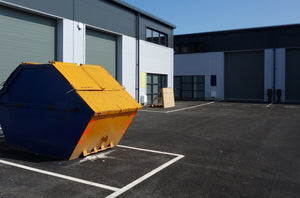
Dos and Don't of Skip Hire
By Peter Sampson
Introduction:
Skip hire is a convenient and cost-effective way to manage waste, but it's important to follow proper dos and don'ts to ensure responsible waste management. This guide will provide a comprehensive overview of the dos and don'ts of skip hire, including proper usage of skips, what to avoid when using skips, and the responsibilities of skip hire companies.
Do choose the right size skip for your waste:
It's important to choose the right size skip for your waste to ensure efficient and cost-effective waste management. A skip that is too small will require multiple trips to the landfill, which can be time-consuming and expensive. A skip that is too large will be a waste of resources and money. Choose a skip size that is appropriate for your needs and consider the amount of waste you will be generating.
Do place the skip on a flat and level surface:
Placing the skip on a flat and level surface will ensure that the skip is stable and safe. Skips that are placed on uneven or sloped surfaces can tip over and cause damage to property or injury to people. Choose a location that is flat, level, and accessible for the skip truck to pick up and drop off the skip.
Do fill the skip evenly to prevent overloading:
Filling the skip evenly is important to prevent overloading and to ensure that the skip is stable and safe. Overloading the skip can cause it to tip over and damage property or cause injury. Fill the skip evenly, making sure not to exceed the maximum weight limit, and avoid stacking waste too high.
Do use a tarp or cover to keep the waste contained:
Using a tarp or cover will help keep the waste contained and prevent it from spilling out of the skip. A tarp or cover will also protect the waste from the elements and prevent rainwater from entering the skip.
Do label hazardous waste properly and dispose of it separately:
Hazardous waste, such as chemicals, batteries, and electronics, must be labeled properly and disposed of separately. Hazardous waste can pose a risk to human health and the environment if not handled and disposed of properly. Be sure to label hazardous waste clearly and separate it from non-hazardous waste.
Do recycle as much waste as possible:
Recycling waste is important to reduce the amount of waste that goes to the landfill and to minimize the environmental impact of waste. Skip hire companies are responsible for properly disposing of waste and recycling as much waste as possible. Encourage your skip hire company to recycle as much waste as possible and recycle your waste whenever possible.
Don't overload the skip:
Overloading the skip is dangerous and can cause the skip to tip over, damaging property or causing injury. It's important to avoid overloading the skip and to follow the maximum weight limit specified by the skip hire company. Overloading the skip can also result in additional fees.
Don't put hazardous waste in the skip:
Hazardous waste, such as chemicals, batteries, and electronics, must be disposed of separately and cannot be placed in a regular skip. Hazardous waste can pose a risk to human health and the environment if not handled and disposed of properly. Be sure to label hazardous waste clearly and separate it from non-hazardous waste.
Don't place the skip on a public road without a permit:
Placing a skip on a public road without a permit is illegal and can result in fines. Be sure to obtain the necessary permits before placing a skip on a public road and follow all local regulations.
Don't light fires or burn waste in the skip:
Lighting fires or burning waste in the skip is illegal and dangerous. It can also result in damage to the skip and release harmful pollutants into the environment. Dispose of waste properly and avoid lighting fires or burning waste in the skip.
The Responsibilities of Skip Hire Companies:
Skip hire companies have legal and environmental obligations when it comes to waste management. They are responsible for properly disposing of waste, recycling as much waste as possible, and promoting responsible waste management practices. They also have a responsibility to educate customers on the dos and don'ts of skip hire and to ensure that all waste is handled in an environmentally-friendly manner.
Conclusion:
In conclusion, following the dos and don'ts of skip hire is important for responsible waste management. By choosing a reputable skip hire company and following proper usage guidelines, you can ensure that your waste is properly disposed of and recycled. This guide provides a comprehensive overview of the dos and don'ts of skip hire and highlights the importance of choosing a responsible and eco-friendly waste management solution.
-
“We are always here to help, whatever the question”
-
Our Accreditations
We are accredited by several leading industry and construction bodies proving we are an industry leader. Click below to find out more about our accreditations.